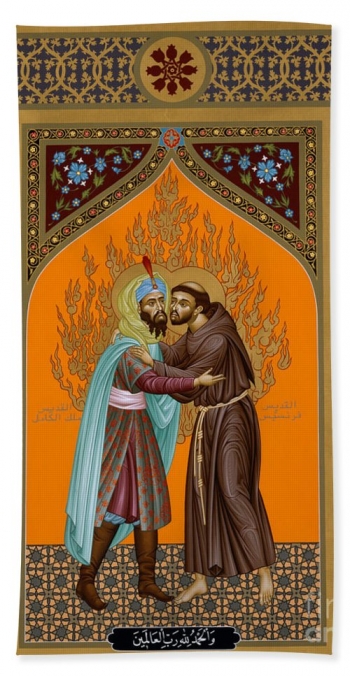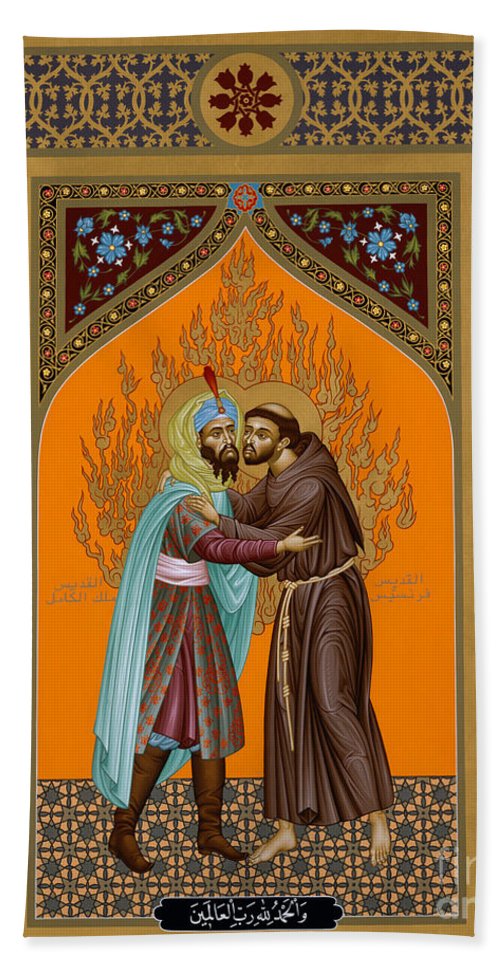
.jpg) Paul Thelakat
Paul Thelakat

The Second Crusade (1147–1150) was the major crusade launched from Europe. It was launched as a response to the fall of the county of Edessa in 1144, which was the seat of Chaldean Church from whom Syrian Catholics of Kerala got their Syrian tradition. This crusade was preached by Saint Bernard of Clairvaux. Time has come for a rethink on the crusades and to take a stand on which saint we must follow, St Francis or St Bernard? The Pope follows Francis. It seems there are men and women in Kerala Church who prefer to follow the preacher of the crusade.
Saint Francis was also an active player in the crusade as he crossed the line of control to meet Malek al-Kamil, the Sultan of Egypt. This was made the subject of a famous fresco in Assisi, Italy, and has been the inspiration for the documentary The Sultan and the Saint. The Second Vatican Council issued the 1965 Declaration which for the first time expressed the Church’s “esteem for … the Moslems.” Pope Francis’ visit to the UAE was a part of its government-declared ‘Year of Tolerance 2019’ -- an initiative that will include events to celebrate international religious diversity.
The UAE government has established a Ministry of Tolerance, the Arab world’s first, to work against “sectarian, ideological, cultural and religious bigotry,” in the words of Vice President Sheikh Mohammed Bin Rashid. Pope Francis joined eminent Muslim, Jewish and other Christian clerics in an appeal for communal coexistence so desperately needed in a world suffering from violence and persecution across humanity’s religious divides. The visit’s moving imagery included Christians and Muslims together attending the first Papal mass on the peninsula. Yet, this powerful symbolism will have real impact only if it inspires us all to take concrete steps -- notably by governments, educational institutions and faith-based organizations.
The Pope also wrote an encyclical letter (Fratelli Tutti) to all men and women of good will. In it, Pope Francis presented St Francis as our model and is silent on Bernard. It is good to remember that Simone Weil (1909-1943), a French Jewish philosopher and mystic who was an ardent devotee of Christ, refused to receive baptism at the last moment and wrote to her spiritual father: “What frightens me is the Church as a social structure. Not only on account of its blemishes, but from the very fact that it is something social. There were some saints who approved of the Crusades or the Inquisition. I cannot help thinking that they were in the wrong. I cannot go against the light of conscience.”
Pope Francis wrote in the encyclical: “Of the counsels Francis offered, I would like to select the one in which he calls for a love that transcends the barriers of geography and distance, and declares blessed all those who love their brother ‘as much when he is far away from him as when he is with him.’ In his typical simple and direct way, St. Francis expressed the essence of a fraternal openness that allows us to acknowledge, appreciate and love each person, regardless of physical proximity, regardless of where he or she was born or lives.” (No. 1). Perhaps, it is the only way Christians can remain true followers of the crucified. The stand of the Pope has to be put in the context of the theory of Samuel Huntington’s clash of civilizations. How do we face the religious fundamentalism found in almost all religions? Our world faces not only Islamic fundamentalism; the temptation to religious fundamentalism is seen in communities of all hues in varying degrees.
We are facing the challenge of a totally different kind of person, a foreigner, an alien who thinks, acts, feels and speaks differently. The war of the elimination of the other will never end. We have to learn from history. The 20th century was an epoch of human tragedies – two world wars, Nazism, Communism, Hitler, Stalin, Mao, Pol Pot etc. The tragic loss of millions of human lives in the name of ethnicity, nationalism, culture and utopian ideologies continues. Man’s real enemy remains man himself – homo hominis lupus.
The war against war continues with peace based solely on hope. We are repeating the same error, an idealism that forms a pious conception of the unconscious; the unconscious rules as fate. There has ever been only one ethics, the amor fati of the political actor who is an anti-God. The 20th century was one of death of God – death of a moral God. We see vapours of cleverness, but not the capacity to improve the human condition. Humans can transform men into uncomplaining animals. The insane mass-manufacture of corpses is preceded by the historically and politically intelligible preparation of living corpses. The criminals everywhere constitute the aristocracy of the camps. They have corrupted all human solidarity. Here the night has fallen on the future. When no witnesses are left, there can be no testimony. There are hundreds of thousands of us here, all living in absolute solitude. That is why we are subdued no matter what happens.
The attack on the moral person might still have been opposed by man's conscience, which tells that it is better to die a victim than to live as a bureaucrat of murder. The alternative is no longer a choice between good and evil, but between murder and murder. After 1929, thousands of German citizens in every social milieu found themselves driven by an urgent need to take refuge from the mounting chaos offered by Nazism. Temptation to thoughtless communal feeling is higher possibility in some so-called educated “lovers” of Church for they confuse scientific rationality and moral thinking, which are entirely two things. This shift can happen among the educated youth, whose professions are related to science and technology, for the obvious reason that scientific rationality is wrongly understood as moral reason. There may be leaders who join the hate campaign to protect communally and politically their power.
These atrocities were not perpetrated by devils or by humans with special killing viruses in their blood, but by ordinary men who simply forgot they were humans. These were men and women who succumbed to hate propaganda of some who hid behind certain ‘isms’ like nationalism, casteism, and racism. They all have one common denominator – hatred to humans. Hannah Arendt who wrote Eichmann in Jerusalem comes up with the real understanding of the Nazi which killed 60 lakhs of Jews.
She wrote that it is “inappropriate for the Nazis as all the talk about the demonic element in Hitler and so forth. It seems to me that we have to see these things in their total banality, in their prosaic triviality, because that’s what truly characterizes them. Bacteria can cause epidemics that wipe out nations, but they remain merely bacteria. I regard any hint of myth and legend with horror” (p. 64).
“When I speak of the banality of evil, I do so on the strictly factual level, pointing to a phenomenon which stared one in the face at the trial. Eichmann was no Iago and no Macbeth, and nothing would have been further from his mind than to determine with Richard III ‘to prove a villain.’ Except for an extraordinary diligence in looking out for his personal advancement, he had no motives at all…He merely, to put the matter colloquially, never realized what he was doing” (pp. 196, 287).
Eichmann in his trial said he never killed anyone; he simply obeyed orders of his government. He declared that he had lived his whole life according to the Kantian definition of duty. Kant rules out blind obedience. He was hanged for his blind obedience for his crime against humanity. He was a man without thought. As we think we are called to acting and judging, social behavior and convention is predicated on an absence of thought, as most of the time we rely on custom and habit, that is, on prejudices. In our autonomy, mental activities interrupt the automatic process of social life and allow us to act and judge independently. Thus, the mind's autonomy is a condition for freedom and moral responsibility. On issues of right and wrong there cannot be neutral position, such moral neutrality is trying to live outside of human family.
Are we failing to pay attention to what is happening in the world? The non-participant's conscience, because it was grounded in thinking, was not automatic and reversible, but attuned to reality. Eichmann's sheer thoughtlessness had predisposed him to his great crimes and that his remoteness from reality had made him unaware of the moral aspects of his actions. This particular case illuminated the possibility that thoughtlessness is a greater problem than those criminals who have deeply evil instincts. He may be an especially gross example of thoughtlessness, but his moral failure is indicative of a general problem. He is the characterization of the moral collapse that has the dual effect of exacerbating the moral problem for the average person while at the same time placing the solution within the grasp of everyone. Each person has the ability to think and is expected to use that ability and be reversible, but attuned to realty.
We could conclude that everyone is responsible to pay attention to reality, and not just to adopt the opinions of people around them. There can be no new discoveries in moral philosophy -- that what is right and what is wrong has always been known. Every person automatically carries within himself a voice that tells him what is right and what is wrong. As shown in the case of anyone, humans' ability to recognize moral phenomena can be severely compromised. The German’s did compromise such ability and they live their shame in history.
We do have so many hate-mongers in our society who refuse to use their moral reasoning. They spread hatred which can kill, build concentration camps and create killing fields. The lynching of people in India is a clear symptom of thoughtless crowds being created by irresponsible hate-mongers. Hate can also put on religious attire. “Religion exists once,” says Jan Patocka, “the secret of the sacred, orgiastic, or demonic mystery has been integrated, subjected to the sphere of responsibility.” But that integration does not happen and remains in demoniac ecstasy tied to a culture of death.
Religion is responsibility or it is nothing at all. Today, the danger is that knowing so many particulars, we are losing the ability to see the questions and their foundation. Our hate-mongers obviously were different from the ordinary image-makers. Their distinction lies in that they were problem-solvers as well. Hence they were not just intelligent, but people who prided themselves on being "rational," and they were indeed to a rather frightening degree above "sentimentality" and in love with a "theory," of the world of sheer mental effort.